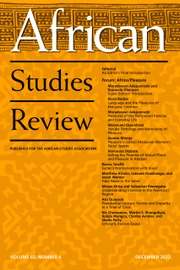There are many types of sources, more than those listed below, but consider using the three below in various aspects of your research. Different types of sources serve different purposes, so using a variety of source types will help you write a well-rounded paper.
Reference sources, like dictionaries and encyclopedias, provide you with background information on a topic. Gaining foundational knowledge is a good idea before taking a dive in article databases because the kind of information in the databases is very specific, and you might not yet have some of the needed terminology.
Although there are many general encyclopedias, such as Wikipedia and World Book Encyclopedia, there are many specialized encyclopedias that focus on particular subjects or disciplines.
Examples:
"Colonialism, Overthrow of: Women and the Nationalist Struggle" is an entry within the Encyclopedia of African History.
Oxford University Press' "Women and Post-Independence African Politics" offers an overview and bibliography of important works. Find more overviews and bibliographies related to women's history in Africa by visiting oxfordre.com/africanhistory/browse?t0=ORE_AFH:REFAFH029
Like reference sources, books can help you get a broader understanding of a topic. They can also provide context for the specific studies you will come across in article databases. They also analyze primary source documents from a specific time period. For fields like history, books and book chapters can be very helpful.
Scholarly books are published by university presses, such as UC Press, NWU Press, etc.
Monograph books are books in which all of the chapters have been written by, typically, one author.
Anthologies are books in which every chapter is written by a different author. The chapters are collected into one book by an editor.
Example:
 The anthology Women in African Colonial Histories (Allman, Geiger, and Musisiis) a scholarly book published by Indiana University Press. Chapter 10, by Tashjian and Allman, is called "Marrying and Marriage on a Shifting Terrain: Reconfigurations of Power and Authority in Early Colonial Asante."
The anthology Women in African Colonial Histories (Allman, Geiger, and Musisiis) a scholarly book published by Indiana University Press. Chapter 10, by Tashjian and Allman, is called "Marrying and Marriage on a Shifting Terrain: Reconfigurations of Power and Authority in Early Colonial Asante."
Scholarly articles are usually reviewed by experts in a process known as peer review before they are published in journals, publications focused on a particular subject or professional activity. The purpose of scholarly articles is to share research findings.
Scholarly articles in the Arts and Humanities may read more like essays, rather than reports on scientific experiments. In the Humanities, scholars are make logical arguments based on the evidence they have researched and analyzed. In history, for example, a scholar may look at the primary source documents from the time period they are studying.
Example:
"Afr ican Studies Review (ASR) is the flagship scholarly journal of the African Studies Association (USA). The ASR publishes the highest quality African studies scholarship in all academic disciplines. The ASR’s rigorous interdisciplinary peer review seeks to contribute to the development of scholarly conversations of interest to the diverse audience of the Association’s membership and to the growth of African studies in North America, on the African continent, and in a global comparative context" ("African Studies Review").
ican Studies Review (ASR) is the flagship scholarly journal of the African Studies Association (USA). The ASR publishes the highest quality African studies scholarship in all academic disciplines. The ASR’s rigorous interdisciplinary peer review seeks to contribute to the development of scholarly conversations of interest to the diverse audience of the Association’s membership and to the growth of African studies in North America, on the African continent, and in a global comparative context" ("African Studies Review").
Here is a sample article by Iris Berger titled "African Women's Movements in the Twentieth Century: A Hidden History" that was published in the December 2014 issue.
University of West Florida, John C. Pace Library (3:53)
University of West Florida, John C. Pace Library (4:06)